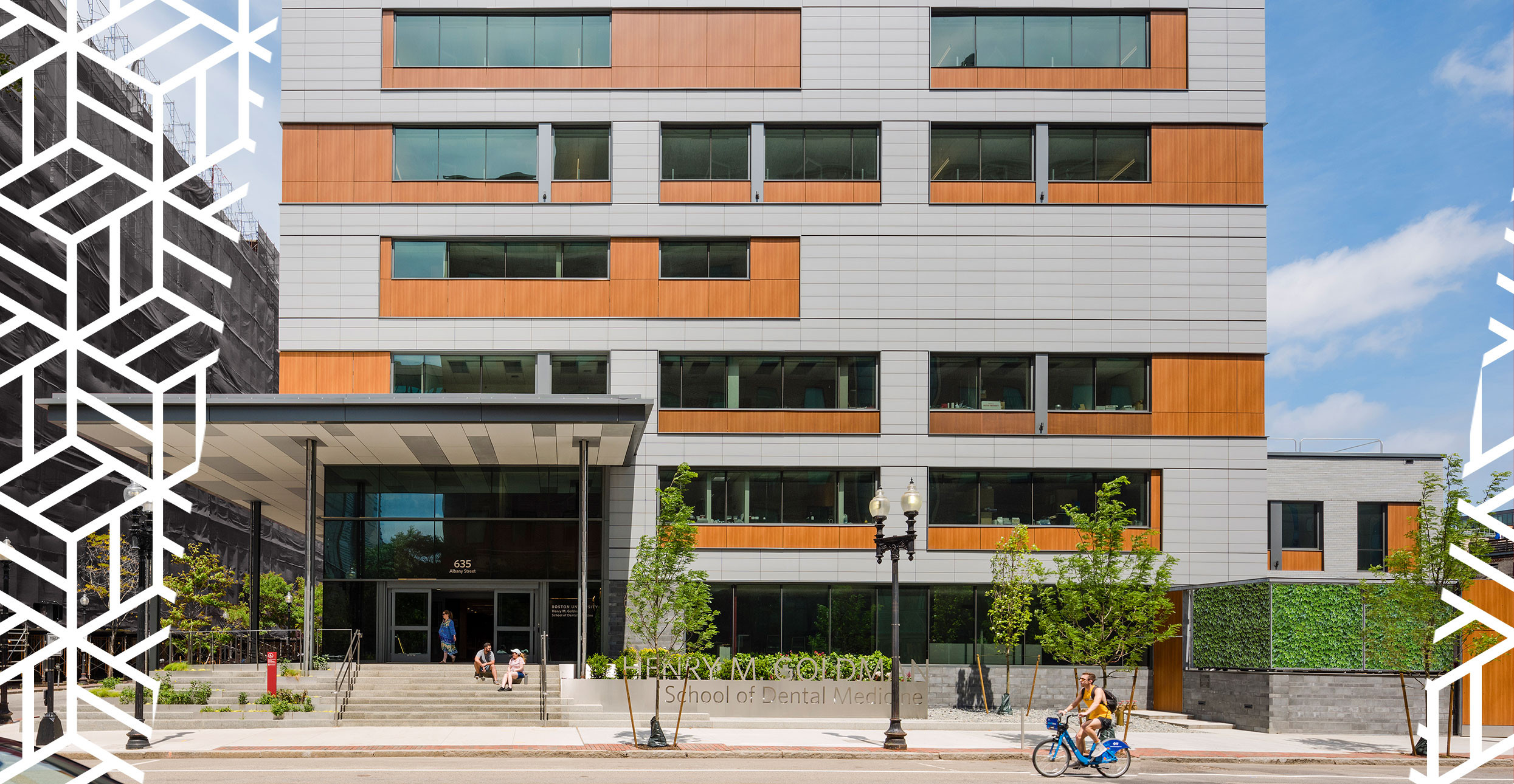Shawmut has completed a $115 million expansion and renovation of Boston University’s Henry M. Goldman School of Dental Medicine (GDSM). The project broke ground in early 2018 after a seven-year planning period and was completed in July 2021.
The three-year, four-phase project transformed the existing facility, increased the building’s size by about 48,000 square feet, and expanded clinical spaces by 70 percent in an effort to improve the educational experience for students and to enhance patient care, experience, and retention; to integrate a pre-clinical simulation learning center to support the school’s innovative digital dentistry curriculum; and to improve energy efficiency and comfort. Shawmut partnered on the project with architecture firm SmithGroup and Compass Project Management.
The project also transformed the exterior of the existing facility at 635 Albany Street: the original mid-century building, constructed in 1970 and first expanded in 1973, was re-clad with a modern façade, bringing the look of the facility into the 21st century and aligning the building’s look with the school’s innovative and cutting-edge reputation. The building has also achieved LEED Gold Certification.
“We’re honored to have partnered with Boston University to transform and enhance the GSDM, a global leader in dental education,” said Kevin Sullivan, Executive Vice President of New England Region at Shawmut Design and Construction. “GSDM was the first dental school in the country to implement a ‘fully digital’ vision for providing oral healthcare to its patients and for educating its students, so this cutting-edge clinical facility reflects a leading-edge approach to innovative education. The improvement and expansion firmly position the university as a trailblazer and will enhance the experience of its patients.”
The phased approach began with the renovation of the basement and first floor, along with a new patient and visitor entrance and corresponding new address on Albany Street. This phase also included the construction of the dental repair shop, supply store, receiving area, and an onsite central sterilization area to fully support the school’s patient care operations.
The building then received a seven-story addition on its west side and a two-story addition on its north side, as well as a renovation of 63,000 square feet that allows for improved predoctoral clinical spaces, the integration of the school’s preclinical Simulation Learning Center into the Albany Street facility, and student collaboration and peer-to-peer learning through the creation of a variety of student-focused common areas.
The new predoctoral Patient Treatment Center, which is split over three floors and five distinct spaces, has 100 dental chairs, an increase of 28 chairs from the original facility, and is outfitted with state-of-the-art dental technology. It also includes cutting-edge laboratories with digital radiography with two-dimensional and three-dimensional imaging and robust five-axis milling units; the school has also incorporated 3D printing at a large scale into its treatment center.
The Simulation Learning Center was relocated into the main facility at 635 Albany Street from its original location across the street. The new 117-station center, which also includes two teacher stations, is outfitted with state-of-the-art technology, including simulators, intraoral scanners, ultrasonic scalers, electric handpieces, curing units for composite restorations, and a high-speed evacuation system. These technologies match what students will use once they enter the Patient Treatment Center, ensuring that students’ preclinical education is a true simulation of what they will encounter in the clinical portion of their experience.
“Here at GSDM, we believe we must be ahead of the industry as a whole in order to ensure that we are educating students who will be leading practitioners in the digital dentistry era,” said Dean ad interim Cataldo Leone. “The completion of this transformative project ensures that we have the facilities we need to deliver on that mission.”
The project also created a number of student-centered collaborative spaces throughout the building, including a Student & Resident Lounge on the first floor to provide opportunities for students to gather with their peers to study, socialize, and learn from each other through informal interactions. The collaborative spaces will dramatically improve the student experience at GSDM and will strengthen the fabric of the school community.
Media Coverage: Boston Business Journal| High-Profile | Boston Real Estate Times
